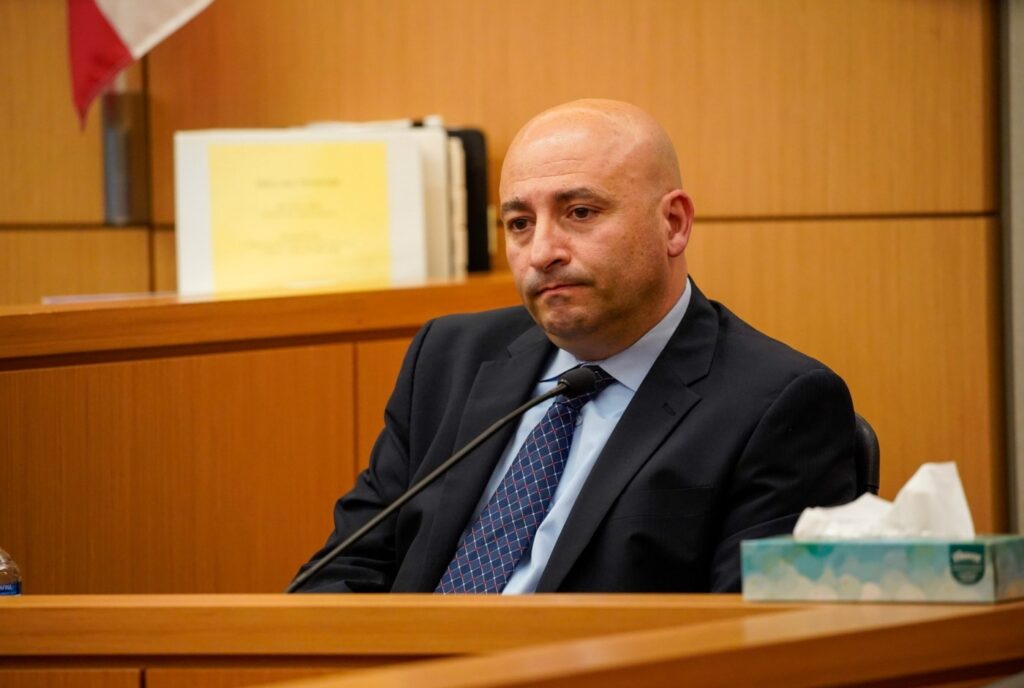
An Orange County Superior Court judge who failed to turn over evidence as a prosecutor in a 2010 murder case indicated Tuesday, June 11, that the fault may have been with sheriff’s investigators.
Ebrahim Baytieh, testifying in a hearing on whether murder defendant Paul Gentile Smith should go free because of the lack of disclosure, has said he didn’t know the evidence in question existed until 10 years after the trial.
On Monday, Baytieh testified he didn’t know what went wrong. On Tuesday, he said he depended on investigators to let him know what evidence was available for discovery.
“The presumption I worked on is that the police agency gives us everything that’s there,” Baytieh testified, under questioning by San Diego County Superior Court Judge Daniel Goldstein. “I worked based on the protocol they had, which is they bring me everything.”
Goldstein responded that Baytieh was still head of the prosecutorial team in the case, which includes the sheriff’s investigators, and, ultimately, responsible for turning over discovery to the defense. Sheriff’s officials have said the evidence was properly booked and available for discovery at the time of trial.
In a rare occurrence, Baytieh was under oath and on the witness stand in the case against Smith, who was convicted in 2010 of fatally stabbing his boyhood friend 18 times and torching the body in Sunset Beach.
Smith’s conviction was overturned in 2021 amid arguments that his constitutional rights were violated when evidence was not disclosed that multiple jailhouse informants were used against him. Only one informant was disclosed to the defense at the time of trial.
Smith now faces a retrial and his case was sent to Goldstein in San Diego to avoid a conflict with the Orange County bench. Orange County Assistant Public Defender Scott Sanders requested the hearing as part of his attempt to get the murder charges dismissed because of the prosecution’s conduct.
Baytieh was fired from his high-level job in the district attorney’s office in 2022, purportedly for his handling of the Smith case. Still highly regarded in the legal community, he was subsequently elected judge in June 2022.
In his second and last day of testimony, Baytieh said Tuesday he was trained at the district attorney’s office that evidence not introduced at trial and not considered to be exculpatory did not have to be disclosed to the defense. Baytieh said he now knows better.
Baytieh’s testimony adds another chapter to the scandal prompted by Orange County’s secret use of jailhouse informants, which unraveled the case against Scott Dekraai, who killed eight people in a 2011 shooting rampage at a Seal Beach beauty salon.
The judge in the Dekraai case ruled that he could not get a fair hearing because of the way informants were used against him. At that point, the death penalty was taken off the table and Dekraai ultimately pleaded guilty. He received multiple life sentences without the possibility of parole.
Related links
Ex-OC prosecutor testifies he doesn’t know why evidence wasn’t disclosed in murder case
Former top OC prosecutor conspired to hide evidence in murder case, defense attorney alleges
San Diego County judge takes up OC murder case, prosecutorial misconduct allegations
Misconduct allegations in OC murder prosecution center stage in San Diego courtroom
OC judge scheduled to testify on allegations he withheld evidence as a prosecutor
During his tenure as a prosecutor, Baytieh became the district attorney’s office’s main defender in the snitch scandal, denying allegations that informants were used improperly and in violation of defendants’ rights. Baytieh now admits the office was wrong.
On Tuesday, Sanders spent much of the day trying to get Baytieh to explain why he did not charge an inmate who ostensibly was trying to help Smith hire a hitman to kill a sheriff’s investigator. Sanders’ theory is that the inmate, Jeffrey Platt, actually was a jailhouse informant pretending to be cooperating with Smith — an informant who was not disclosed to the defense by Baytieh until 10 years after the trial.
Baytieh said he first learned of the evidence — taped recordings of Platt explaining his plan for three inmates to extract information from Smith — in 2019 and quickly retrieved copies for defense attorneys.
